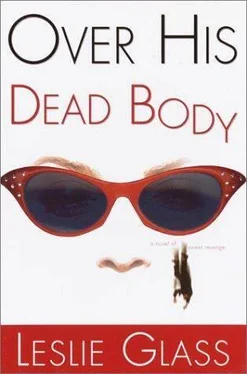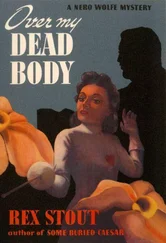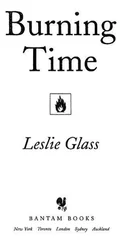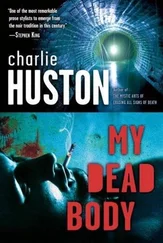"What's the big hurry?" Marsha complained, taking the glasses off and frowning at her mother as she rattled the car keys.
"Where's Teddy?" Cassie demanded, feeling hurt for so many reasons, she thought her heart would explode just like Mitch's brain.
"He's having breakfast. He'll meet us there."
Cassie shook her head. "I don't want him in Daddy's den."
"Well, you locked the door. How's he going to get in?"
So they'd checked. It was war. Cassie jumped out of the car and marched back into the house. Teddy was sitting at the kitchen table wearing khakis and one of his father's expensive Italian knit shirts. He was reading the sports section of the newspaper, eating a bowl of his father's favorite cereal, the one holdout from his childhood-Frosted Flakes, with the tiger on the box. "Hi, Mom," he said without looking up.
"Teddy, what are you up to?" Cassie demanded.
"I'm eating breakfast."
"I don't want you in Daddy's files."
"No problem. I don't want to know."
"What do you mean you don't want to know?"
"Whatever," he said, taking a huge bite, crunching loudly, swallowing, taking another, as if actually trying to infuriate her further.
Cassie hesitated in the doorway. Her tone softened, though her heart remained stone. "What does ‘whatever' mean?"
"Marsha's the one who wants to know. I told her whatever, too."
"Teddy, what are you talking about?"
Teddy didn't look up from the page. "Nothing."
Something about the way he said "nothing" alarmed her. Teddy had been the one with the sweetest disposition in the family. Everybody else walked all over him. It occurred to her that with the good business sense inherited from his father, maybe Teddy was the finagler. It had to be one of the three of them. Would Mitch protect his children if they went crazy with the spending? Marsha? Never. But his boy Teddy…? She considered it. Teddy was his father's favorite. Cassie couldn't see Teddy at Bergdorf's, though. He probably didn't know where it was. Not Teddy. "Well, are you coming?" she asked finally.
"If I have to," he muttered.
From the garage, Marsha called out, "For God's sake, what are you doing in there?"
"Yes, you have to, Teddy. Daddy wants to see you," Cassie told him.
"Sure he does," Teddy mumbled, lifting the bowl to drink the milk.
Cassie closed the kitchen door quietly, headed back into the garage, got into the Mercedes, and closed that door quietly, too. Something was up between those kids.
Marsha was busy powdering her nose in the mirror. "I don't know what you're so worried about. Teddy got all of three hundred on his math SATs. You don't actually think he could read a bank statement, do you?"
"Marsha, what's going on?" Cassie asked.
"Nothing." Marsha started the engine and pulled out.
Again that "nothing."
"Teddy is no dummy," Cassie defended her son.
"Yes, he is," Marsha said.
Agitated by the sibling rivalry and all the things that she didn't know about the doings of her own family, Cassie grabbed Marsha's sunglasses off the dashboard. Carefully, she put them over the scarf tied around her head so they wouldn't come in contact with those awful stitches that were pulling her face so tight, she couldn't breathe at all. She felt as if she were choking to death from those stitches, and they itched like hell. If she could rip them right out of her head and go back to her old life, she would do it.
How cruel it was for Marsha to wave those Tiffany receipts with her signature on them at her and to look so young and great when her father was in the hospital and her mother was falling apart. Cassie was so hurt, she didn't say a single word all the way to the hospital. In the parking lot, she switched her attention to Mitch so sick in intensive care and composed herself for him. She went into the hospital lobby, determined to become the family hero. She'd bring Mitch back from the dead. He'd be so grateful for her help and support that his character would change completely. He'd give her his money to manage, and they'd all live happily ever after. With this strategy all planned out, she marched down the glass corridor into the wing that housed the Neurological Intensive Care unit.
"How is Mitchell Sales?" she asked the tough-looking nurse guarding the nine glass rooms reserved for head traumas.
"He's doing just fine," Nurse Helen Gurnsey said smoothly without looking at her. "His doctor has been on rounds already. Don't stay too long, honey. We have a five-minute rule here."
Five minutes! Cassie's breath caught. What could she accomplish in five minutes?
"You okay, honey?" Now the nurse looked up at her with just a hint of concern.
"Yes, fine," Cassie said. She didn't want any more sympathy for the car crash she hadn't had.
Two picture-windowed rooms down, she slipped into Mitch's cubicle, which was packed with expensive computerized monitoring devices and the spiderweb of plastic tubes that kept those oh-so-important fluids moving from plastic bags to Mitch's inert body and out of his body into more plastic bags. They still looked obscene. The respirator pumped air into his lungs, and the sound was enough to unnerve anyone. "Doing just fine" seemed to mean unchanged. The space was still too cramped to accommodate a visitor's chair, so Cassie stood by the bed and looked at the pathetic creature her husband had become.
"Mitch?" she whispered. "Can you hear me?" She saw him lying there and was actually, truly touched by his vulnerability. It was the first she'd ever seen in him. In recent years, with his great success, he had developed a slightly sarcastic, even sneering way about him that always made her nervous in his presence. Whenever he came in the door, she could feel her body begin its dance of anticipatory agitation. It was as if he came home looking for something wrong, which made him find something wrong. It was always some omission on her part that she could never guess in advance. Right now there was nothing critical about him except his condition.
Like yesterday, his eyes were half open. The young Dr. Wellfleet had told her that if the pupils were enlarged, maybe a blood vessel had exploded. Or something. Now that Mitch was stabilized, though, Mark Cohen, whom Cassie trusted, seemed to be afraid that more clots would form and move around-to his brain, his heart, his lungs. Maybe a whole freight train of them. Cassie thought of those blood clots traveling through Mitch's arteries that had to be badly clogged with foie gras and hollandaise. Maybe they wouldn't make it through.
As she studied him, immobilized and helpless, a quartet of thoughts played in counterpoint in her mind: IhatethismanIlovethismanIhopehelivesIhopehedies. And then the fugue played more slowly. What will I do without him? Where will I go? Who will I be with? How can I manage my children, who think I'm the enemy? Oh God, help me please!
Yesterday she'd been so stunned by Mitch's great fall that she hadn't been able to listen to all the things Mark had to say about those pupils and clots and vessels. But now she leaned over to see for herself what state Mitch's pupils were in. His eyes were not open wide enough for her to get a good look. She didn't want to pry them open with that picture window exposing them so clearly to view from anyone passing in the hall, so she gave him a tight little smile.
"Honey, it's Cassie. The nurse says you're doing just fine," she said brightly, figuring that she'd just used up about four of her five minutes. Those fake signatures of hers burned in her gut and hampered her breathing. The I-hate-this-man theme came up loudly, drowning out the others.
"Mitch, honey. I don't have a charge account at Tiffany's, or Bergdorf Goodman. I don't have a Chase MasterCard. In fact, I don't have a single account with only my name on it. There's been some kind of mix-up." She said this very sweetly. He was in intensive care, after all.
Читать дальше











